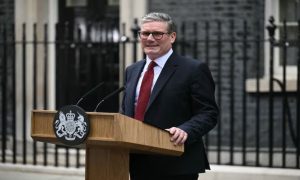NAIROBI, Kenya: Kenya is reeling from unprecedented unrest that erupted into violent protests, leaving parts of the parliament complex ablaze and prompting the government to deploy the military.
The protests, which began peacefully, turned deadly as police clashed with demonstrators opposing proposed tax hikes. President William Ruto’s government faces intense backlash amid escalating tensions.
The initially peaceful protests, led mostly by young Kenyans, began last week with thousands marching in Nairobi and other cities against the proposed tax increases. However, on Tuesday afternoon, the situation deteriorated rapidly. Police fired live rounds at protesters, who then stormed the parliament complex, resulting in scenes of chaos and destruction. Rights groups reported that the violence left five people dead and over 30 injured.
In response to the escalating violence, Defence Minister Aden Bare Duale announced the deployment of the army to assist the police in managing the security crisis. President Ruto condemned the violence, warning that his government would not tolerate what he described as acts of “violence and anarchy.” He insisted that those responsible for the destruction and attacks on institutions would face severe consequences.
The government has been caught off guard by the scale of opposition to the tax proposals, which have sparked anger among the youth. Images broadcast on local TV showed the parliament building ransacked, with burnt furniture and shattered windows. As police attempted to disperse the crowds, several bodies were seen lying on the ground, and protest organizers urged people to leave safely.
On Wednesday morning, a heavy police presence surrounded the parliament, and the smell of tear gas lingered in the air. A police officer described the previous day’s events as “madness” and expressed hope for calm. Earlier in the day, protests had been largely peaceful, but tensions escalated in Nairobi, with some demonstrators throwing stones at police, who responded with tear gas, water cannons, and live bullets.
The Kenya Human Rights Commission reported that at least one protester had been shot by police, and journalists observed several individuals bleeding heavily near the parliament. A joint statement from rights groups, including Amnesty International’s Kenya chapter, confirmed that police had killed five people. The internet also experienced disruptions, with services crashing briefly before being restored overnight.
The international community has reacted with alarm to the unrest. The White House called for calm, and over ten Western nations, including Canada, Germany, and Britain, expressed shock at the violence outside the Kenyan parliament. Moussa Faki Mahamat, head of the African Union commission, urged all parties to exercise restraint and avoid further violence. Opposition leader Raila Odinga accused the government of using excessive force against demonstrators.
The protests stem from long-standing grievances over the rising cost of living, which intensified as lawmakers debated the 2024 finance bill proposing tax hikes. The government argues that the increases are necessary to manage Kenya’s massive debt, which stands at approximately 10 trillion shillings ($78 billion), or 70 percent of the country’s GDP. Despite rolling back some of the more controversial proposals, the government plans to raise fuel prices and export duties to address a significant budget shortfall.
While Kenya is considered one of East Africa’s most dynamic economies, a third of its 52 million people live in poverty. The proposed tax hikes have exacerbated economic frustrations, leading to the current wave of protests and unrest.























